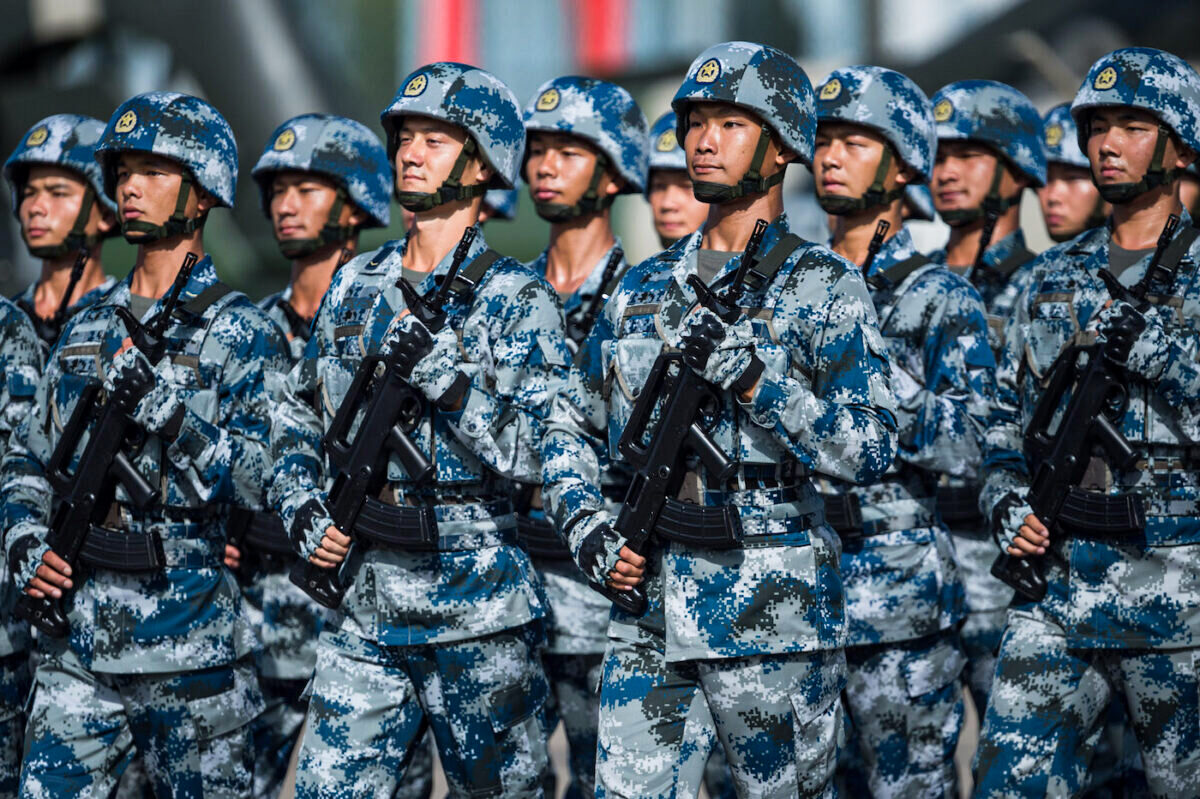Biden’s New National Defense Strategy Already Failed
CommentaryThe Biden administration released its 2022 National Defense Strategy (NDS) on Oct. 27 (pdf). This followed the National Security Strategy by two weeks. The NDS rightly calls the upcoming decade “decisive” for the United States. It reveals a suitable sense of urgency. Its “integrated deterrence” combines both conventional and nuclear military force against U.S. enemies. The NDS rightly notes America’s unique mix of strengths, including our “democratic values, our open society, our diversity, our base of innovation, our culture of ingenuity, our combat experience, our globe-spanning network of Alliances and partnerships, and above all our extraordinary All Volunteer Force.” But then weakness and failure begins to leak through the verbiage. While Russian aggression and threats from Iran, North Korea, and terrorists are rightly called out, China is downplayed as a “challenge” or “competitor.” Totalitarian China is not just America’s longest-term challenge. It is our longest-term enemy, stretching back to the Korean War and now again revealing itself through support of Moscow’s bloodthirsty drive for power in Ukraine. It should go without saying that China, the state, has become an enemy of democracy and human rights not because of China’s civilizational strengths or wonderful Chinese people, who are repressed more than almost anyone on the planet. China, the civilization and people, have resisted the perpetrator, the Chinese Communist Party (CCP). But nowhere is this ultimate cause of global instability, this transnational terrorist organization that parades itself as a legitimate state, called out by the NDS. Through the CCP’s exploitation of 1.4 billion people in China, its power is growing to the point of threatening the U.S.-led world order that emerged after the Second World War. That order undergirded most of the peace between nations, along with a growth in human rights and democracy, that the world enjoyed over the past 75 years. But with China’s rise as a global economic power, so has democracy’s star fallen among an increasing number of nations. Rejecting democracy and its rule of law for the chaos of international war and civil conflict that would result from Beijing in the lead should not be an option for any country in an era of nuclear weapons. Tourists look on as a Chinese military helicopter flies past Pingtan Island, one of mainland China’s closest points to Taiwan, in Fujian province on Aug. 4, 2022. (Hector Retamal/AFP via Getty Images) The Biden strategy gives too much leeway to countries and companies to join democracy’s enemies, including through trade, and still enjoy the support of the United States. Given the rising threat, all must now be expected to explicitly choose the side of democracy. The administration fails at its top four defense priorities in the NDS. It fails to effectively “defend the homeland” against cyberattacks and the theft of up to $600 billion annually in intellectual property. It fails to “deter strategic attacks” against partners such as Ukraine and Taiwan, whose existence is threatened by ongoing weaknesses in American defense strategy. It fails to “deter aggression” against allies like the Philippines, some of whose territories—for example at Subi Reef—are now Chinese military bases. Subi, in the South China Sea, was captured by Beijing in 1988 and nobody raised a finger in its defense. These military failures are a failure to “ensure America’s military advantage and resilience,” given that our advantage lies in part with the integrity of our alliance structure, the faith our partners have in that structure, and the freedom of the seas for the American and allied commerce that supports our military spending. China is beginning the process of shutting down free commerce through its militarized artificial islands in the South China Sea and its increasing pugnacity over the Taiwan Strait. If the U.S. military were really so advantaged and resilient, as the NDS promises, we would already have prevailed against all the threats above. The reality is the opposite. The Biden administration, and many administrations before, stretching back to the 1970s, presided over the relative decline of American military power in preference for short-term benefits that result from trading with the enemy. China and Russia sell us and our allies things we do not need, and in exchange we deliver the economic, technological, and thus military means to destroy ourselves. The loss of American military power relative to our top two adversaries could not be more dangerous given their aggressive development of hypersonic missiles, artificial intelligence, and nuclear weapons, all in service to an offensive strategy that seeks to use nuclear threats for not only deterrence, but compellence. The CCP has links to terrorists and rogue states who could act for them in our destruction through nuclear terrorism. Their links to terrorists go unmentioned in the NDS. Whil

Commentary
The Biden administration released its 2022 National Defense Strategy (NDS) on Oct. 27 (pdf). This followed the National Security Strategy by two weeks.
The NDS rightly calls the upcoming decade “decisive” for the United States. It reveals a suitable sense of urgency. Its “integrated deterrence” combines both conventional and nuclear military force against U.S. enemies.
The NDS rightly notes America’s unique mix of strengths, including our “democratic values, our open society, our diversity, our base of innovation, our culture of ingenuity, our combat experience, our globe-spanning network of Alliances and partnerships, and above all our extraordinary All Volunteer Force.”
But then weakness and failure begins to leak through the verbiage.
While Russian aggression and threats from Iran, North Korea, and terrorists are rightly called out, China is downplayed as a “challenge” or “competitor.”
Totalitarian China is not just America’s longest-term challenge. It is our longest-term enemy, stretching back to the Korean War and now again revealing itself through support of Moscow’s bloodthirsty drive for power in Ukraine.
It should go without saying that China, the state, has become an enemy of democracy and human rights not because of China’s civilizational strengths or wonderful Chinese people, who are repressed more than almost anyone on the planet.
China, the civilization and people, have resisted the perpetrator, the Chinese Communist Party (CCP). But nowhere is this ultimate cause of global instability, this transnational terrorist organization that parades itself as a legitimate state, called out by the NDS.
Through the CCP’s exploitation of 1.4 billion people in China, its power is growing to the point of threatening the U.S.-led world order that emerged after the Second World War. That order undergirded most of the peace between nations, along with a growth in human rights and democracy, that the world enjoyed over the past 75 years. But with China’s rise as a global economic power, so has democracy’s star fallen among an increasing number of nations.
Rejecting democracy and its rule of law for the chaos of international war and civil conflict that would result from Beijing in the lead should not be an option for any country in an era of nuclear weapons.

The Biden strategy gives too much leeway to countries and companies to join democracy’s enemies, including through trade, and still enjoy the support of the United States. Given the rising threat, all must now be expected to explicitly choose the side of democracy.
The administration fails at its top four defense priorities in the NDS. It fails to effectively “defend the homeland” against cyberattacks and the theft of up to $600 billion annually in intellectual property. It fails to “deter strategic attacks” against partners such as Ukraine and Taiwan, whose existence is threatened by ongoing weaknesses in American defense strategy. It fails to “deter aggression” against allies like the Philippines, some of whose territories—for example at Subi Reef—are now Chinese military bases.
Subi, in the South China Sea, was captured by Beijing in 1988 and nobody raised a finger in its defense.
These military failures are a failure to “ensure America’s military advantage and resilience,” given that our advantage lies in part with the integrity of our alliance structure, the faith our partners have in that structure, and the freedom of the seas for the American and allied commerce that supports our military spending.
China is beginning the process of shutting down free commerce through its militarized artificial islands in the South China Sea and its increasing pugnacity over the Taiwan Strait.
If the U.S. military were really so advantaged and resilient, as the NDS promises, we would already have prevailed against all the threats above. The reality is the opposite.
The Biden administration, and many administrations before, stretching back to the 1970s, presided over the relative decline of American military power in preference for short-term benefits that result from trading with the enemy.
China and Russia sell us and our allies things we do not need, and in exchange we deliver the economic, technological, and thus military means to destroy ourselves.
The loss of American military power relative to our top two adversaries could not be more dangerous given their aggressive development of hypersonic missiles, artificial intelligence, and nuclear weapons, all in service to an offensive strategy that seeks to use nuclear threats for not only deterrence, but compellence.
The CCP has links to terrorists and rogue states who could act for them in our destruction through nuclear terrorism. Their links to terrorists go unmentioned in the NDS.
While purporting to rely on our alliance structures and nuclear “extended deterrence” to protect allies and partners from the conventional wars that can escalate to nuclear conflict, we have clearly failed in that aim.
Russia invaded Ukraine twice in eight years, and is now threatening to use nuclear weapons against our NATO allies in Europe. China is threatening to invade Taiwan and has signaled a willingness to use nuclear weapons there, and more generally against Australia and the Philippines in its regional expansion.

If China, Russia, Iran, and North Korea attacked their neighbors simultaneously, our ability to defend our partners abroad would be overwhelmed. The risk from this concatenation of dictators cannot be overstated, yet the NDS does not fully clarify the threat.
America cannot rely on weak allies who lack the necessary means to deter aggression from Beijing and Moscow. Ukraine, which relinquished its nuclear deterrent, is proof.
Partners such as Ukraine, Georgia, Japan, South Korea, Taiwan, and Australia, all on the frontlines defending democracy against the territorial expansion of China and Russia, need their own independent nuclear deterrence.
Instead, the NDS repeats the old and failed strategy of nuclear nonproliferation. The Nonproliferation of Nuclear Weapons Treaty (NPT) opened for signature in 1968. Since then, India, Pakistan, and North Korea became enduring nuclear weapon states. Iran is well on its way. Meanwhile, all nuclear dictatorships are threatening their neighbors and demanding existential territorial concessions.
The NPT is an abject failure, but we have not admitted as much because it would require a complete revision of our military strategy.
Ukraine has shown us that unless we do more, our relatively unarmed allies will be vulnerable to debilitating wars, casualties, and refugee flows. Since February, over 16,000 Ukrainian civilians were killed or injured. Over 6 million are refugees. Thousands of Ukrainian soldiers are dead. War is strengthening Ukraine’s nationalism, but destroying the resources it could have brought to NATO if allowed in as a nuclear-weapons state in 1994.
That year, Ukraine gave up its nuclear weapons. Russia, the United States, and the United Kingdom promised to respect Ukraine’s territorial integrity in exchange. Russia broke that promise in 2014. Kiev was duped by not only Moscow, but by Washington and London’s faulty strategy.
So goes the U.S. mutual defense treaty of 1951 with the Philippines. That country is now having its reefs taken as Chinese military bases. Its fishermen are turned back from their ancient fishing grounds in their own exclusive economic zone. The country is barred by China from drilling in its own offshore oil blocks and gas fields.
American military strategy has repeatedly failed. Vietnam was followed by Iraq, Afghanistan, and Syria. We look weak to the world’s dictators, who as a result become more aggressive. The latest NDS feeds this weakness by continuing to back away from full-strength nuclear deterrence. Rather than rearm, the NDS continues the Obama-era policy of removing all but one nuclear warhead per intercontinental ballistic missile under the false claim that this reduces adversary incentives for a nuclear first strike.
In fact the opposite is true. The weaker our nuclear deterrence, the more incentive our enemies have to strike first, not only with nuclear weapons against our homeland (admittedly unlikely) but with conventional strikes on allies and partners (which risks geographic expansion and escalation to nuclear war).
By its own metrics, the Biden administration’s NDS is a failure. The world needs real strategy, straight talk, and tougher leadership from Washington.
Views expressed in this article are the opinions of the author and do not necessarily reflect the views of The Epoch Times.












